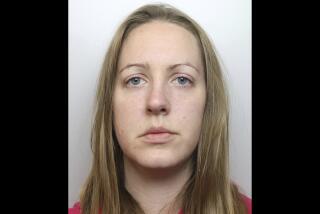The World & Nation
- Share via
The Houston mother accused of methodically drowning her five children in the family bathtub has been found mentally competent to stand trial on capital murder charges.
A jury in Houston deliberated more than eight hours before concluding on Saturday that Andrea Yates--the former nurse who said she heard Satan’s voice speaking to her in her jail cell--understands the charges against her and is able to assist her attorneys.
Yates, 37, faces one count of capital murder for the deaths of her two oldest children on June 20. A grand jury indicted her on a second charge of capital murder for the death of a child under 6--her infant daughter, Mary.
She is not charged with the murder of her two other children, but the prosecutor said that at trial he will introduce evidence regarding their deaths. Yates’ children were aged 6 months to 7 years. She has pleaded not guilty by reason of insanity. Her family says she began to suffer a psychotic form of postpartum depression after the birth of her fourth child.
Yates stood silent and expressionless as State District Judge Belinda Hill read the jury’s verdict. Her husband, Russell Yates, a NASA computer engineer who has been supportive of his wife since her arrest, dropped his head into his hands.
“At least that issue is decided,” defense attorney George Parnham said. “Now it’s time to get prepared to defend her in the trial.”
A trial date has not been set, but Harris County Dist. Atty. Chuck Rosenthal has said prosecutors will seek the death penalty. Legal experts have questioned Yates’ ability to get a sympathetic jury: Texas leads the nation in applying the death penalty, and Harris County has sent more inmates to their deaths than any other in the state.
During the three-day competency hearing, the jury of 11 women and one man heard testimony from mental health experts. One psychologist called by the prosecution concluded that while Yates is mentally ill, she is competent and able to understand what is happening.
“As far as I know, her psychotic features are in full remission. Her depression is not in full remission,” testified Dr. Steven Rubenzer, who performed a court-appointed evaluation of Yates. He said Yates’ mental state has been improving.
Since her incarceration, Yates has been given medications that doctors say have improved her mental condition, which a jail nurse described as catatonic.
Defense attorneys argued during the hearing that Yates would eventually stand trial, but said her present mental state is fragile and asked she be given more time. During Friday’s testimony, the medical director of the Harris County Jail’s psychiatric unit said Yates still displays evidence of psychosis.
“It’s my opinion that her illness at this point is in partial remission,” Dr. Melissa Ferguson said.
A psychologist who examined Yates in the days immediately after the drownings testified she told him she saw Satan and heard his voice in her cell.
Yates was arrested at her home after calling police and admitting she had killed her children. The four youngest--John, 5; Paul, 3; Luke, 2; and Mary, 6 months--were found lying on a bed under a sheet, still wet. Noah, 7, was dead in the bathtub. Yates told police she had to chase the boy through the house as he tried to escape.
The case has sparked a debate about the potential seriousness of postpartum depression. Yates had twice attempted suicide, and at least one therapist questioned the couple’s decision to have more children.
“This will surely guarantee future psychosis and depression,” wrote one.
The competency hearing was attended by members of National Organization for Women, who marched against the death penalty in Yates’ case and in favor of mental health care for women suffering from postpartum depression.
Under Texas law, a defendant can stand trial only if he meets a legal definition of competency. In Yates’ case, the competency issue deals only with her state of mind now, not at the time of the crime.
More to Read
Sign up for Essential California
The most important California stories and recommendations in your inbox every morning.
You may occasionally receive promotional content from the Los Angeles Times.












